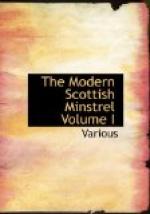Oh! whence the change that
now alarms,
Fills this sad
heart and tearful eye,
And conquers the once powerful
charms
Of youth, of hope,
of novelty?
’Tis sad Experience,
fatal power!
That clouds the
once illumined sky,
That darkens life’s
meridian hour,
And bids each
fairy vision fly.
She paints the scene—how
different far
From that which
youthful fancy drew!
Shews joy and freedom oft
at war,
Our woes increased,
our comforts few.
And when, perhaps, on some
loved friend
Our treasured
fondness we bestow,
Oh! can she not, with ruthless
hand,
Change even that
friend into a foe?
See in her train cold Foresight
move,
Shunning the rose
to ’scape the thorn;
And Prudence every fear approve,
And Pity harden
into scorn!
The glowing tints of Fancy
fade,
Life’s distant
prospects charm no more;
Alas! are all my hopes betray’d?
Can nought my
happiness restore?
Relentless power! at length
be just,
Thy better skill
alone impart;
Give Caution, but withhold
Distrust,
And guard, but
harden not, my heart!
[40] These tender and beautiful verses are transcribed from Johnson’s “Musical Museum,” in a note to which they were first published by the editor, Mr David Laing. He remarks that he “has reason to believe” that they are from the pen of Mrs Stewart. (See Johnson’s “Musical Museum,” vol. iv. p. 366, new edition. Edinburgh, 1853.)
ALEXANDER WILSON.
The author of the celebrated “American Ornithology” is entitled to an honourable commemoration as one of the minstrels of his native land. Alexander Wilson was born at Paisley on the 6th of July 1766. His father had for some time carried on a small trade as a distiller; but the son was destined by his parents for the clerical profession, in the National Church—a scheme which was frustrated by the death of his mother in his tenth year, leaving a large family of children to the sole care of his father. He had, however, considerably profited by the instruction already received at school; and having derived from his mother a taste for music and a relish for books, he invoked the muse in solitude, and improved his mind by miscellaneous reading. His father contracted a second marriage when Alexander had reached his thirteenth year; and it became necessary that he should prepare himself for entering upon some handicraft employment. He became an apprentice to his brother-in-law, William Duncan, a weaver in his native town; and on completing his indenture, he wrought as a journeyman, during the three following years, in the towns of Paisley, Lochwinnoch, and Queensferry. But the occupation of weaving, which had from the first been unsuitable




